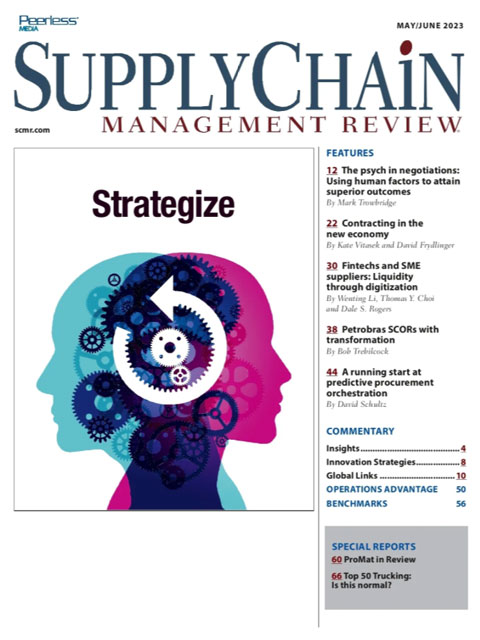Sorry, but your login has failed. Please recheck your login information and resubmit. If your subscription has expired, renew here.
May-June 2023
If you were dropped onto this planet and landed at McCormick Place in the heart of Chicago in the middle of March, you would probably conclude that planet Earth had been overrun by robots. Everywhere you turned on the ProMat conference floor, there was a robot lifting something, putting something away, or carrying something to another location. But, despite a conference hall overrun by technology, the on-the-ground reality is a bit different. Not so long ago, commercial real estate firm Prologis estimated the number of facilities with any type of automation at about 10%. But that is changing—quickly. A recent report from JLL found that one-in-two… Browse this issue archive.Need Help? Contact customer service 847-559-7581 More options
The phrase “the new economy” was popularized in a 1983 cover article in Time, titled “The New Economy,” which described the transition from heavy industry to a technology-based economy. More than 40 years later, the phrase is still used to describe recent business trends and evolutions affecting how organizations do business. If the global pandemic taught us anything, it is that the phrase “business as usual” has been replaced by “business happens.”
Today’s new economy is characterized by faster, more complex, and intertwined trading partner relationships. The need for flexibility is paramount. But so is the need for innovation and sustainable supply chain solutions. In truth, supplier relationships are crucial to a company’s long-term success. Yet today’s business leaders are facing a dilemma—traditional purchasing approaches and contracts don’t work in complex strategic relationships where the parties are highly dependent on each other, future events can’t be predicted, and flexibility and trust are required. Conventional approaches undermine—rather than promote—the partnership-like relationships needed to cope with uncertainty.
The contracting paradox
Of all the many traps and possible pitfalls in negotiating a complex contract, one of the most insidious is the “contracting paradox.” The contracting paradox is the delusion that we write contracts to make plans, but we cannot actually plan accurately. And, as a nice twist, we trick ourselves into believing we can plan.
Why is the contracting paradox such an easy trap to fall into for contracting, procurement, and outsourcing management experts? As experts, their task is to write forward-looking contracts that attempt to cover every risk and limit every possible liability. In short, they strive for the complete contract that addresses every “what-if” possibility. But despite their best efforts and contracts, they are not bulletproof—and never will be.

This complete article is available to subscribers only.
Log in now for full access or start your PLUS+ subscription for instant access.
SC
MR
Sorry, but your login has failed. Please recheck your login information and resubmit. If your subscription has expired, renew here.
May-June 2023
If you were dropped onto this planet and landed at McCormick Place in the heart of Chicago in the middle of March, you would probably conclude that planet Earth had been overrun by robots. Everywhere you turned on the… Browse this issue archive. Access your online digital edition. Download a PDF file of the May-June 2023 issue.The phrase “the new economy” was popularized in a 1983 cover article in Time, titled “The New Economy,” which described the transition from heavy industry to a technology-based economy. More than 40 years later, the phrase is still used to describe recent business trends and evolutions affecting how organizations do business. If the global pandemic taught us anything, it is that the phrase “business as usual” has been replaced by “business happens.”
Today’s new economy is characterized by faster, more complex, and intertwined trading partner relationships. The need for flexibility is paramount. But so is the need for innovation and sustainable supply chain solutions. In truth, supplier relationships are crucial to a company’s long-term success. Yet today’s business leaders are facing a dilemma—traditional purchasing approaches and contracts don’t work in complex strategic relationships where the parties are highly dependent on each other, future events can’t be predicted, and flexibility and trust are required. Conventional approaches undermine—rather than promote—the partnership-like relationships needed to cope with uncertainty.
The contracting paradox
Of all the many traps and possible pitfalls in negotiating a complex contract, one of the most insidious is the “contracting paradox.” The contracting paradox is the delusion that we write contracts to make plans, but we cannot actually plan accurately. And, as a nice twist, we trick ourselves into believing we can plan.
Why is the contracting paradox such an easy trap to fall into for contracting, procurement, and outsourcing management experts? As experts, their task is to write forward-looking contracts that attempt to cover every risk and limit every possible liability. In short, they strive for the complete contract that addresses every “what-if” possibility. But despite their best efforts and contracts, they are not bulletproof—and never will be.
SC
MR


Latest Supply Chain News
Latest Podcast

 Explore
Explore
Procurement & Sourcing News
- A reshoring history lesson
- Strategic cost savings differ from cutting costs
- Planning fatigue may be settling in
- Inflation, economic worries among top supply chain concerns for SMBs
- April Services PMI declines following 15 months of growth, reports ISM
- Despite American political environment, global geopolitical risks may be easing
- More Procurement & Sourcing
Latest Procurement & Sourcing Resources

Subscribe

Supply Chain Management Review delivers the best industry content.

Editors’ Picks






